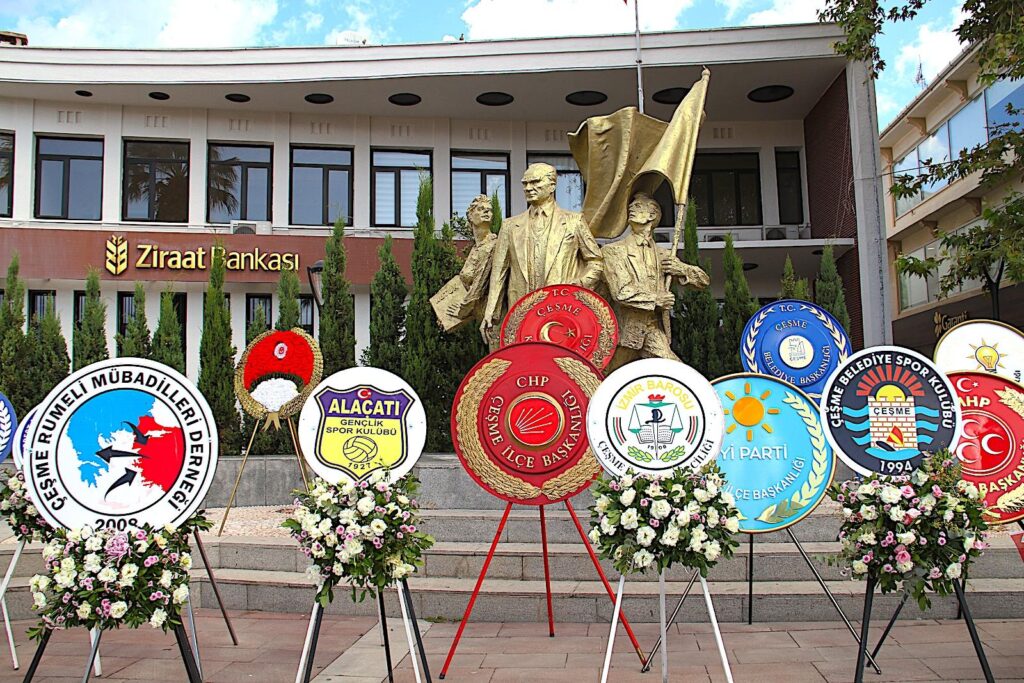For international travellers, it is best, if possible, to try and avoid travel to Çeşme during Turkish public holidays (and adjacent weekends), especially those in the summer months. While there may be additional events and festivals, hotels and car hire prices can increase dramatically, and facilities such as public beaches can get crowded. The peak periods of the Turkish Public Holidays can also challenge public services, causing power outages, lowering water pressure, and reducing mobile connections and internet speeds.
Turkish Public Holidays – Table of Contents
Below are the provisional public holiday dates for Tūrkiye. Turkish Public Holidays that fall at the weekend are NOT customarily transferred to a working weekday:
2025 – Turkish Public Holidays
| Dates | Holiday |
|---|---|
| 1 January | New Year’s Day |
| 29 March (Saturday) | Ramazan Bayramı Eve (Eid) |
| 30 March (Sunday) | Ramazan Bayramı (Eid) |
| 31 March | Ramazan Bayramı (Eid) |
| 1 April | Ramazan Bayramı (Eid) |
| 23 April | National Sovereignty and Children’s Day |
| 1 May | Labour & Solidarity Day |
| 19 May | Atatürk and Youth & Sports Day |
| 5 June – half day | Kurban Bayramı Eve (Eid al-Adha) |
| 6 June | Kurban Bayramı (Eid al-Adha) |
| 7 June (Saturday) | Kurban Bayramı (Eid al-Adha) |
| 8 June (Sunday) | Kurban Bayramı (Eid al-Adha) |
| 9 June | Kurban Bayramı (Eid al-Adha) |
| 15 July | Democracy and National Unity Day |
| 30 August (Saturday) | Victory Day |
| 28 October – half day | Republic Day Eve |
| 29 October | Republic Day |
2026 – Turkish Public Holidays
| Dates | Holiday |
|---|---|
| 1 January | New Year’s Day |
| 21 March (Saturday) | Ramazan Bayramı Eve (Eid) |
| 22 March (Sunday) | Ramazan Bayramı (Eid) |
| 23 March | Ramazan Bayramı (Eid) |
| 24 March | Ramazan Bayramı (Eid) |
| 23 April | National Sovereignty and Children’s Day |
| 1 May | Labour & Solidarity Day |
| 19 May | Atatürk and Youth & Sports Day |
| 28 May – half day | Kurban Bayramı Eve (Eid al-Adha) |
| 29 May | Kurban Bayramı (Eid al-Adha) |
| 30 May (Saturday) | Kurban Bayramı (Eid al-Adha) |
| 31 May (Sunday) | Kurban Bayramı (Eid al-Adha) |
| 1 June | Kurban Bayramı (Eid al-Adha) |
| 15 July | Democracy and National Unity Day |
| 29 August (Saturday) | Victory Day Eve |
| 30 August (Sunday) | Victory Day |
| 28 October – half day | Republic Day Eve |
| 29 October | Republic Day |
Below is an explanation of the origins and activities of each of the Turkish Public Holidays:
Ramazan Bayramı
Ramazan Bayramı (also known as Eid al-Fitr or Şeker Bayramı in Tūrkiye) is a significant Islamic holiday marking the end of Ramadan, the holy month of fasting. It is a time of celebration, gratitude, and community and holds deep cultural and religious significance in Tūrkiye. The three-day holiday follows Ramadan, a month during which Muslims fast from dawn to sunset as a practice of self-discipline, spiritual reflection, and devotion to God. During this period, schools, government offices, and many businesses close, filling the streets with festive activities. The end of Ramadan is celebrated with the sighting of the new moon, which marks the beginning of Shawwal (the 10th month in the Islamic lunar calendar).
Muslims are encouraged to give to charity to ensure that even the less fortunate can partake in the celebrations. Family and community gatherings are central to Ramazan Bayramı. It’s common for people to visit the graves of deceased relatives, attend gatherings at family homes, and share meals. The holiday is often called Şeker Bayramı (“Sugar Festival”) because it involves sharing and eating sweets, especially with children. Typical treats include baklava, lokum (Turkish delight), and chocolates. Younger people visit their elders to pay their respects, and it’s traditional to kiss the hands of the elderly while receiving blessings in return. The standard greeting during this time is “Bayramınız mübarek olsun” or simply “İyi bayramlar,” which means “Happy Bayram.”
Kurban Bayramı
Kurban Bayramı (known internationally as Eid al-Adha or the Feast of Sacrifice) is one of Tūrkiye’s most important religious holidays in the Islamic world. It commemorates the willingness of the Prophet Ibrahim (Abraham) to sacrifice his son, Ismail (Ishmael), as an act of obedience to God. However, just as Ibrahim was about to make the sacrifice, God provided a ram to be sacrificed in his son’s place. Muslims worldwide, including in Tūrkiye, celebrate this act of faith and submission. Kurban Bayramı is usually a four-day public holiday in Tūrkiye. Schools, government offices, and many businesses are closed during this time.
The central ritual of Kurban Bayramı is the kurban (sacrifice), in which Muslims who can afford it sacrifice an animal. The meat is divided into three parts: One-third is kept by the family for personal consumption, and one-third is given to relatives, friends, and neighbours. One-third is distributed to the poor and needy. Sacrificing symbolises devotion to God, generosity, and social responsibility toward the less fortunate. Visiting family members and paying respects to the elders is a significant part of the holiday. Much like Ramazan Bayramı, younger people visit their elders, and families come together to share meals.
National Sovereignty and Children’s Day
National Sovereignty and Children’s Day (Ulusal Egemenlik ve Çocuk Bayramı) is a significant public holiday in Tūrkiye, celebrated on April 23rd each year. It is a unique holiday combining two essential themes: national sovereignty and children, reflecting both the founding of modern Tūrkiye and the country’s value on its future generations. The holiday commemorates the opening of the Grand National Assembly of Turkey (Türkiye Büyük Millet Meclisi) on April 23, 1920, during the Turkish War of Independence. This was a crucial step in establishing the Turkish Republic, led by Mustafa Kemal Atatürk, symbolising the transfer of power from a monarchy to a representative, democratic system, establishing national sovereignty—the idea that the Turkish people themselves would determine their future.
Mustafa Kemal Atatürk dedicated April 23rd as a holiday for children, emphasising that they are the country’s future. He believed that the protection and education of children were critical to the nation’s success and progress. It was the first holiday in the world dedicated to children. Atatürk’s vision was that the new republic should prioritise its young citizens, fostering a sense of responsibility and ensuring that future generations would uphold the ideals of democracy and national sovereignty. On this day, children symbolically “take over” the government. Children act as the president, prime minister, and ministers, discussing issues that are important to them.
Labour and Solidarity Day
Labour and Solidarity Day (also known as International Workers’ Day or May Day in many countries and Emek ve Dayanışma Günü in Tūrkiye) is celebrated on May 1st each year. Since 2009, a public holiday in Tūrkiye has recognised workers’ contributions and promoted workers’ rights, solidarity, and social justice. The day is marked by rallies, marches, and demonstrations organized by labour unions and workers’ organizations, particularly in major cities like Istanbul and Ankara.
Atatürk, Youth, and Sports Day
Atatürk, Youth, and Sports Day (Atatürk’ü Anma, Gençlik ve Spor Bayramı) is a national holiday in Tūrkiye celebrated on May 19th each year. The holiday marks May 19, 1919, when Mustafa Kemal Atatürk landed in Samsun to start the Turkish War of Independence. This event is seen as the first step in the eventual creation of the Republic of Turkey in 1923, following the fall of the Ottoman Empire. Ceremonies are held to honour Mustafa Kemal Atatürk’s role in establishing the Turkish Republic. One of the most prominent events takes place at Anıtkabir, Atatürk’s mausoleum in Ankara,
The holiday emphasises the importance of youth in shaping Tūrkiye’s future and focuses on sports and physical fitness. Sporting events and athletic competitions are held nationwide, involving students and young athletes. In addition to sporting events, the day includes a variety of cultural performances such as folk dances, theatrical shows, parades and concerts.
Democracy and National Unity Day
Democracy and National Unity Day (Demokrasi ve Millî Birlik Günü) is a national holiday in Tūrkiye, observed on July 15th each year. The public holiday was added after the failed coup attempt of July 15, 2016, and honours the resilience of Turkish democracy. It is a solemn day of remembrance and celebration of national unity, democracy, and freedom.
Victory Day
Victory Day (Zafer Bayramı) is a national holiday in Tūrkiye celebrated on August 30th each year. It commemorates the victory in the Battle of Dumlupınar in 1922, the final battle in the Turkish War of Independence. This victory marked the end of the Greek occupation and paved the way for establishing the Republic of Turkey. Throughout the day, various events occur, including speeches by government officials, cultural performances, and the laying of wreaths at monuments dedicated to those who fought in the war.

Republic Day
Republic Day (Cumhuriyet Bayramı) is a major national holiday in Tūrkiye, celebrated on October 29th each year. It commemorates the proclamation of the Republic of Turkey in 1923, marking the transition from the Ottoman Empire to a modern, secular nation-state under the leadership of Mustafa Kemal Atatürk. Major cities, especially Ankara and Istanbul, host grand parades that feature military displays, traditional performances, and events, including schools and youth organisations. Citizens participate in multiple festivities, including fireworks, concerts, and cultural activities, celebrating the Republic’s values and modern Tūrkiye’s achievements.
See also: LikeCesme.com – Festivals & Competitions
See also: Çeşme Municipality website
